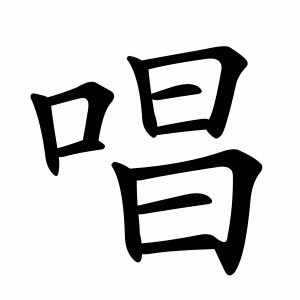唱
- to chant;
- to sing;
Etymology
Phono-semantic compound:
口 (입 구, “mouth”) — denotes vocal expression, speech, singing.
昌 (창성할 창, “prosper, bright”) — provides sound, also implies clear and resonant voice.
Thus, the character literally means “to produce a clear voice with the mouth,” i.e., to sing or chant.
Usage in Korean
In Korean traditional music, refers to vocal performance (e.g., in 판소리).
唱歌 (창가) — to sing a song
合唱 (합창) — chorus, singing together
獨唱 (독창) — solo singing
唱片 (창편) — record, album
唱和 (창화) — antiphonal singing, poetic exchange
唱
부를
창
bureul
chang
Kangxi radical:30, 口 + 8
Strokes:11
Unicode:U+5531
Cangjie input:
- 口日日 (RAA)
Composition:
- ⿰ 口 昌
